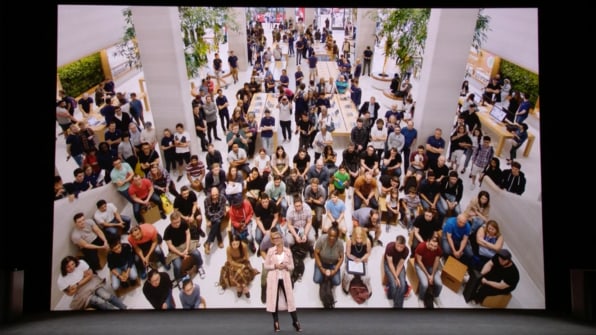Johnny Was Store Scottsdale Fashion Square
In the first few minutes of Apple's almanac iPhone launch event today, sandwiched between a dedication of the outcome space to the late Steve Jobs and a promotional video nigh the Apple tree Sentry, audience members were treated to a cursory interlude about the visitor'southward architecture. In addition to opening its brand-new $v billion Cupertino headquarters designed by Norman Foster, the visitor is in the procedure of overhauling its retail pattern–including re-naming hundreds of stores "boondocks squares."
"We don't telephone call them stores anymore, we call them boondocks squares," said Angela Ahrendts, Apple's senior vice president of retail, on phase describing these gathering spaces.

Information technology'southward a grimly realistic clarification of life in the U.South. today. A few truths: The pitter-patter of individual entities into public space is decades-sometime. New York Metropolis has long been colonized past privately endemic public spaces, which are managed past individual companies. More than 500 plazas, parks, streetscapes, and other public areas are now managed by private companies in New York alone. Meanwhile, Americans are spending more of their free time shopping. The almanac American Fourth dimension Use Survey, published by the Department of Labor in 2016, showed that the average American spends 45 minutes per solar day shopping, compared with about 20 on "civic or religious activities."
Without the upkeep or political support to create new public spaces in cities, it's no surprise that corporations take stepped in. Apple has logical reasons for offering up spaces to "gather" for the public; the company wants to go more people into its stores, and offering more events to create a community around its line of products. Apple is far from solitary in this approach; new malls across the country include "squares" and gathering spaces.
Only the subtle shift in nomenclature matters. Stores will never be public spaces. They are regulated, surveilled, and designed past companies for specific purposes. Sensors, which can measure things like foot traffic and record everything from faces to sounds, are now ubiquitous in retail stores, and will only become more powerful; for instance, Amazon'southward experimental Become store watches what yous pick up so you never take to bank check out.
The "town square" similar place in your community that has computers & people willing to help you is chosen a library, not an Apple tree Store.
— LibrarianShipwreck (@libshipwreck) September 12, 2017
Stores aren't sustainable as public spaces in the long-term, either: Malls and retail complexes have a brusque shelf life. They are not built in neighborhoods that truly demand town squares and plazas. They're subject to rules, written and unwritten, that actual public spaces are not–rules shaped by the concerns of the companies that design and manage them. Daniel Moeckli puts it best in his 2016 book, Exclusion from Public Space: A Comparative Constitutional Analysis:
Individual and semi-public spaces are designed to produce a sensation of similarity, a 'we' feeling within a homogeneous community. As a result, they reduce the kinds of otherness that are institute to be bearable: in these forms of space, the the presence of unlike types of people becomes a subject of business organization… The trend towards privatization of public space may thus undermine the development of people's capacity to conform living with others, the evolution of the 'public sense of self' on which democracy relies.
Don't go me incorrect; public life has always been bound up with the economic system and shopping. The two are linked, but they are not synonymous. In 2017, the correct to safely gather in public has never been more vital nor more important. Nosotros should be fighting for truly public spaces, and using the ones we have more frequently–not ceding them to a sub-genre of retail designed and managed by companies. Calling a store a "town square" simply dilutes the value of actual public spaces.
0 Response to "Johnny Was Store Scottsdale Fashion Square"
Post a Comment